Tamara is one of our talented facilitators who is based in Sydney.
Tamara originally trained as a lawyer but retrained as a counsellor after realising that her keenest interests lay in promoting wellbeing.
She has a track record of working in the domestic and family violence field. As a counsellor, she spent many years doing frontline work with both domestic and family violence victim-survivors and perpetrators. She has also held policy and advocacy roles related to domestic and family violence, most recently as the Sector Development Manager for Domestic Violence NSW.
Tamara has a commitment to supporting improved responses to violence and abuse in general. This led her to work at the Royal Commission into Institutional Responses to Child Sexual Abuse for several years.
Besides being a facilitator for Challenge DV training sessions, Tamara now works as a counsellor and coach in private practice. She also works as a restorative justice practitioner, for sexual abuse cases, with Transforming Justice Australia.
What led you to working with Challenge DV?
I believe that workplaces can play a powerful role in our society responding effectively to domestic and family violence (DFV). I am excited to work for Challenge DV because this enables me to support and equip workplaces to respond effectively.
What do you value most about delivering the training?
I value supporting people, who may not have had much knowledge about DFV and how to respond, to come to grips with this important topic.
What do you value most about being able to support workplaces and people through this work?
When workplaces respond supportively and effectively to DFV, this improves DFV victim-survivors experiences considerably. What I most value about this work is the opportunity to improve the support available to DFV victim-survivors, so they are not left feeling that they are dealing with the DFV alone and without supports.
What’s one thing you wished more people knew about domestic and family violence prevention?
I wish people knew that prevention involves a whole-of-society response showing that DFV is unacceptable and will not be tolerated.
If society could do just one thing to make an impact, what would it be?
Society needs to provide more long-term social housing. Many DFV victim-survivors are unable to leave because they have no secure housing to go to. There is international research showing the amount of social housing we provide in Australia is well below the levels required for an effective response to DFV.



